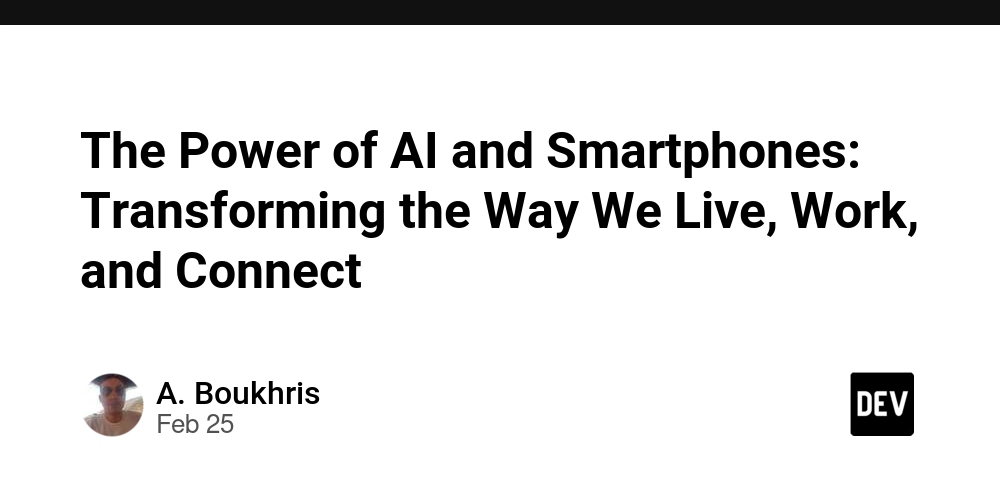The Power of AI and Smartphones: Transforming the Way We Live, Work, and Connect
In the 21st century, two technological forces have emerged as game-changers in our daily lives: artificial intelligence (AI) and smartphones. Individually, each has revolutionized the way we interact with the world. Together, they form a powerful synergy that is reshaping industries, enhancing productivity, and redefining human connectivity. The marriage of AI and smartphones has unlocked unprecedented possibilities, making our devices smarter, more intuitive, and indispensable. The Rise of the Smartphone Revolution Smartphones have come a long way since their inception. What started as a simple communication tool has evolved into a multi-functional device that serves as a camera, GPS, entertainment hub, and personal assistant. Today, smartphones are an extension of ourselves, seamlessly integrating into every aspect of our lives. From managing schedules to streaming content, smartphones have become the central hub of our digital existence. However, the true power of smartphones lies not just in their hardware but in the software that drives them. This is where AI steps in, transforming these devices from mere tools into intelligent companions. AI: The Brain Behind the Smartphone Artificial intelligence has become the backbone of modern smartphones, enabling them to perform tasks that were once the realm of science fiction. AI powers everything from voice assistants like Siri and Google Assistant to advanced camera features like facial recognition and scene optimization. By leveraging machine learning algorithms, smartphones can now understand user behavior, predict needs, and deliver personalized experiences. For instance, AI-driven predictive text and autocorrect features have made typing faster and more accurate. AI-powered virtual assistants can schedule appointments, send messages, and even make recommendations based on user preferences. Meanwhile, AI-enhanced cameras can recognize objects, adjust settings in real-time, and produce stunning photos with minimal effort. Enhancing Everyday Life The integration of AI into smartphones has made everyday tasks more efficient and enjoyable. Consider the following examples: Personalized Experiences: AI analyzes user data to deliver tailored content, whether it’s news, music, or shopping recommendations. Apps like Spotify and Netflix use AI to curate playlists and suggest shows based on individual preferences. Health and Fitness: Smartphones equipped with AI can track physical activity, monitor heart rate, and even detect irregularities in health metrics. Apps like Apple Health and Google Fit use AI to provide insights and encourage healthier lifestyles. Language Translation: AI-powered translation apps like Google Translate break down language barriers, enabling real-time communication across different languages. This has profound implications for travel, business, and global connectivity. Augmented Reality (AR): AI and AR technologies are merging to create immersive experiences. From gaming (e.g., Pokémon Go) to interior design apps that let users visualize furniture in their homes, the possibilities are endless. Revolutionizing Industries The impact of AI and smartphones extends far beyond personal use. Industries across the board are leveraging this powerful combination to drive innovation and efficiency. Healthcare: AI-powered smartphone apps can diagnose skin conditions, monitor chronic diseases, and even assist in mental health therapy. Telemedicine platforms rely on smartphones to connect patients with doctors, making healthcare more accessible. Retail: AI-driven shopping apps analyze user behavior to offer personalized product recommendations. Smartphones also enable seamless mobile payments, transforming the way we shop. Education: AI-powered learning apps provide personalized tutoring, adapt to individual learning styles, and make education more accessible to people worldwide. Transportation: Ride-sharing apps like Uber and Lyft use AI to optimize routes, reduce wait times, and improve the overall user experience. Smartphones are also integral to the development of autonomous vehicles. Challenges and Ethical Considerations While the power of AI and smartphones is undeniable, it also raises important questions about privacy, security, and ethics. The vast amounts of data collected by these devices can be vulnerable to breaches, and the use of AI in decision-making processes can sometimes lead to biased outcomes. As we continue to embrace these technologies, it is crucial to establish robust frameworks to ensure transparency, accountability, and user protection. The Future of AI and Smartphones The future holds even more exciting possibilities. As AI becomes more advanced, smartphones will evolve into even smarter, more intuitive devices. We can expect advancements in areas like natural language processing, emotion recognition, and predictive analytics. The integration of 5G technology will further enhance the capabilities of AI-powered

In the 21st century, two technological forces have emerged as game-changers in our daily lives: artificial intelligence (AI) and smartphones. Individually, each has revolutionized the way we interact with the world. Together, they form a powerful synergy that is reshaping industries, enhancing productivity, and redefining human connectivity. The marriage of AI and smartphones has unlocked unprecedented possibilities, making our devices smarter, more intuitive, and indispensable.
The Rise of the Smartphone Revolution
Smartphones have come a long way since their inception. What started as a simple communication tool has evolved into a multi-functional device that serves as a camera, GPS, entertainment hub, and personal assistant. Today, smartphones are an extension of ourselves, seamlessly integrating into every aspect of our lives. From managing schedules to streaming content, smartphones have become the central hub of our digital existence.
However, the true power of smartphones lies not just in their hardware but in the software that drives them. This is where AI steps in, transforming these devices from mere tools into intelligent companions.
AI: The Brain Behind the Smartphone
Artificial intelligence has become the backbone of modern smartphones, enabling them to perform tasks that were once the realm of science fiction. AI powers everything from voice assistants like Siri and Google Assistant to advanced camera features like facial recognition and scene optimization. By leveraging machine learning algorithms, smartphones can now understand user behavior, predict needs, and deliver personalized experiences.
For instance, AI-driven predictive text and autocorrect features have made typing faster and more accurate. AI-powered virtual assistants can schedule appointments, send messages, and even make recommendations based on user preferences. Meanwhile, AI-enhanced cameras can recognize objects, adjust settings in real-time, and produce stunning photos with minimal effort.
Enhancing Everyday Life
The integration of AI into smartphones has made everyday tasks more efficient and enjoyable. Consider the following examples:
Personalized Experiences: AI analyzes user data to deliver tailored content, whether it’s news, music, or shopping recommendations. Apps like Spotify and Netflix use AI to curate playlists and suggest shows based on individual preferences.
Health and Fitness: Smartphones equipped with AI can track physical activity, monitor heart rate, and even detect irregularities in health metrics. Apps like Apple Health and Google Fit use AI to provide insights and encourage healthier lifestyles.
Language Translation: AI-powered translation apps like Google Translate break down language barriers, enabling real-time communication across different languages. This has profound implications for travel, business, and global connectivity.
Augmented Reality (AR): AI and AR technologies are merging to create immersive experiences. From gaming (e.g., Pokémon Go) to interior design apps that let users visualize furniture in their homes, the possibilities are endless.
Revolutionizing Industries
The impact of AI and smartphones extends far beyond personal use. Industries across the board are leveraging this powerful combination to drive innovation and efficiency.
Healthcare: AI-powered smartphone apps can diagnose skin conditions, monitor chronic diseases, and even assist in mental health therapy. Telemedicine platforms rely on smartphones to connect patients with doctors, making healthcare more accessible.
Retail: AI-driven shopping apps analyze user behavior to offer personalized product recommendations. Smartphones also enable seamless mobile payments, transforming the way we shop.
Education: AI-powered learning apps provide personalized tutoring, adapt to individual learning styles, and make education more accessible to people worldwide.
Transportation: Ride-sharing apps like Uber and Lyft use AI to optimize routes, reduce wait times, and improve the overall user experience. Smartphones are also integral to the development of autonomous vehicles.
Challenges and Ethical Considerations
While the power of AI and smartphones is undeniable, it also raises important questions about privacy, security, and ethics. The vast amounts of data collected by these devices can be vulnerable to breaches, and the use of AI in decision-making processes can sometimes lead to biased outcomes. As we continue to embrace these technologies, it is crucial to establish robust frameworks to ensure transparency, accountability, and user protection.
The Future of AI and Smartphones
The future holds even more exciting possibilities. As AI becomes more advanced, smartphones will evolve into even smarter, more intuitive devices. We can expect advancements in areas like natural language processing, emotion recognition, and predictive analytics. The integration of 5G technology will further enhance the capabilities of AI-powered smartphones, enabling faster data processing and real-time connectivity.
Moreover, the convergence of AI, smartphones, and other emerging technologies like the Internet of Things (IoT) will create a seamlessly connected world. Imagine a future where your smartphone not only manages your schedule but also communicates with your smart home, car, and appliances to create a fully integrated ecosystem.
The power of AI and smartphones lies in their ability to simplify, enhance, and enrich our lives. Together, they have transformed the way we communicate, work, and interact with the world around us. As these technologies continue to evolve, their potential to drive innovation and improve quality of life is limitless. However, it is essential to navigate this transformative journey with caution, ensuring that the benefits of AI and smartphones are accessible to all while addressing the ethical challenges they present. In the end, the true power of AI and smartphones lies not just in their technological capabilities but in their ability to empower humanity












































































































































































![[The AI Show Episode 142]: ChatGPT’s New Image Generator, Studio Ghibli Craze and Backlash, Gemini 2.5, OpenAI Academy, 4o Updates, Vibe Marketing & xAI Acquires X](https://www.marketingaiinstitute.com/hubfs/ep%20142%20cover.png)



























































































































![[DEALS] The Premium Learn to Code Certification Bundle (97% off) & Other Deals Up To 98% Off – Offers End Soon!](https://www.javacodegeeks.com/wp-content/uploads/2012/12/jcg-logo.jpg)


![From drop-out to software architect with Jason Lengstorf [Podcast #167]](https://cdn.hashnode.com/res/hashnode/image/upload/v1743796461357/f3d19cd7-e6f5-4d7c-8bfc-eb974bc8da68.png?#)








































































































.png?#)

































_Christophe_Coat_Alamy.jpg?#)
 (1).webp?#)





































































































![Apple Considers Delaying Smart Home Hub Until 2026 [Gurman]](https://www.iclarified.com/images/news/96946/96946/96946-640.jpg)
![iPhone 17 Pro Won't Feature Two-Toned Back [Gurman]](https://www.iclarified.com/images/news/96944/96944/96944-640.jpg)
![Tariffs Threaten Apple's $999 iPhone Price Point in the U.S. [Gurman]](https://www.iclarified.com/images/news/96943/96943/96943-640.jpg)




































































































































